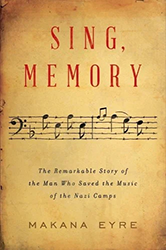This novel draws readers into the aftermath of the Holocaust, viewed through the eyes of Gerta, a sixteen-year-old German Jewish girl who has lost everything but her Papa’s beloved viola. The story begins with the liberation of Bergen-Belsen, where she is suffering from typhus and surrounded by death. What comes next is less about the rescue and recovery of her physical being, and more about the restoration of her personhood as she confronts the staggering loss of her home, her family, her future, and her understanding of who she is in a world forever changed. Music is the thread that weaves throughout this narrative, linking Gerta to her father and her past, saving her as she is sent from camp to camp, and ultimately giving her life meaning as she navigates through her pain and grief toward a new beginning.
Gerta’s father has shielded her from her Jewish identity in an effort to keep her safe, changing the family name to Richter from Rauch, and obtaining papers declaring their Aryan purity. Gerta believes it was Maria, an opera singer posing as her stepmother, who betrayed them, and her limited knowledge of the tenets and traditions of Judaism makes her internment even more disconcerting and traumatic. The end of the war marks the transition of Bergen-Belsen to a displaced persons camp, and the beginning of relearning what it means to eat and sleep enough, dress normally, talk freely, and develop relationships. Gerta finds some solace playing viola in the newly formed camp musical society, but she is less inclined to become attached to anything or anyone. While many survivors elect to anchor their new lives by quickly getting married, Gerta rebuffs the earnest advances of a young man named Lev in favor of a vision of her future in music. Lev is struggling to revive the Jewish identity that used to define him, an identity that Gerta doesn’t share. Ultimately, this is also a love story, and together these two find the will to choose a new path.
Powerfully written, with illustrations by the author, this is a book that strikes at the heart of what it means to be a person when so much of what defined you is gone forever.
Recommended for ages 13 and up.



